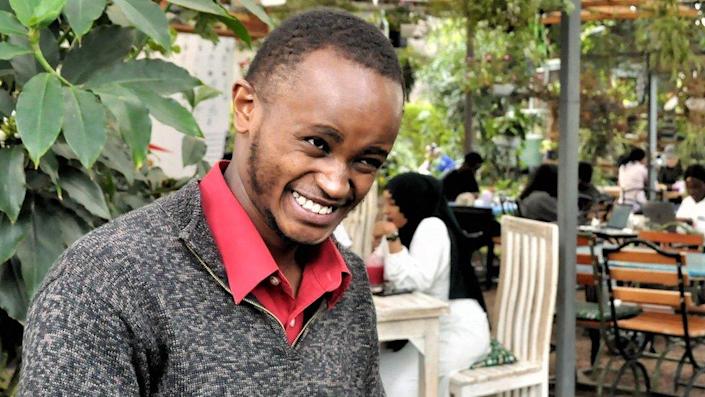
In our series of letters from African journalists, Ismail Einashe visits a café in Kenya which is trying to change perceptions of people with disabilities.


Tucked behind a non-descript gate in an affluent neighbourhood of Kenya’s capital, Nairobi, is a social experiment that points the way to how the prospects of deaf people can be transformed.
By employing deaf staff, who have faced discrimination in almost every aspect of their lives, the Pallet Cafe shows how integration can work.
Weaving their way around the tables and abundant potted plants in this self-styled garden café, the staff take orders using either Kenyan Sign Language, mimes or gestures.
There are posters on display with an introduction to some basic sign language, but for example, the waiters may mime shivering to ask if someone wants a cold bottle of water, and the customer can confirm that with a thumbs up.
Or if an egg is ordered then a fist gesture can be used to ask if the customer wants it hard-boiled or wiggling fingers to indicate soft-boiled.
But apart from that, this could easily be mistaken for any other upmarket café, with people tapping away on their laptops, between sipping a latte or tucking into delicious plates of food.


Edward Kamande, who joined the staff soon after Pallet Cafe opened in 2019, started work as a waiter but is now the manager.
The 26-year-old says the founder, businessman Feisal Hussein, “took a chance on me. He saw that I had something.”
The entrepreneur, a former aid worker, wanted to open a place that would not only serve great dishes, like eggs Benedict and shakshuka (a spicy North African egg dish), but also back disabled people and get them into work.
“My vision was to support the deaf community,” he says of his business which now has three branches. At this branch – in Lavington – more than 30 of the 40 staff are either hearing impaired or deaf.
Mr Kamande believes he is valued for what he can do. “There’s no discrimination in our company, there is freedom here,” he says.
Three years ago, when he first joined the team, Mr Kamande was shy and nervous, his boss says, but now he has become an indispensable part of running the business.
Mr Kamande not only manages the staff but also oversees the finances and keeps an eye on supplies.
He loves his job, he says, and he is especially proud whenever customers commend his staff on their level of professionalism and service.
The vast majority of them had never had a job previously so the work has been life-changing.
At first, Mr Hussein struggled to find people to hire but now he does not have to look hard as people are always dropping off their CVs, he says.
In fact, the café has been so successful that other businesses have asked if he can help them hire deaf workers.
According to Mr Kamande, the biggest obstacle that deaf people face in Kenya is getting the chance to work in the first place.
“There are so many deaf people who don’t have job opportunities,” he says.
It is thought there are at least 600,000 deaf people in the country, and even though discrimination on the grounds of disability is outlawed in the constitution, they continue to face huge obstacles around access to healthcare, education and employment.


Kenyan Sign Language is not widely understood and there is little knowledge about it among public officials.
There are also very few sign language interpreters in Kenya, and no nationally recognised system for registering or checking qualifications.
Even though TV programmes are supposed to incorporate sign language into their programmes, few ever do.
Mr Kamande can speak to make himself understood, but many of his colleagues are not in that position.
“We need education [about deaf issues] in our country,” he says.
He told me about a recent experience a friend had in Nairobi when he was randomly stopped by police and asked to show his ID card.
“They threatened to take him to prison. But he could not answer them back.”
Mr Kamande managed to get to where the friend was and explained to the police that the friend was deaf.
Experiences like this have taught him that deaf people have to stand up for each other in an often hostile environment.
The Pallet Cafe has not only given Mr Kamande a safe space to have a thriving career, it was also where he fell in love.
He met his wife Jacqueline, who is also deaf, while she was working there as a waiter.
They now have an 11-month-old baby son called Godwin, who is not deaf. He proudly shows off photos of his son on his smartphone.
“Because of the café,” he says, “I moved to the next level of life.”
More Letters from Africa:
Follow us on Twitter @BBCAfrica, on Facebook at BBC Africa or on Instagram at bbcafrica






